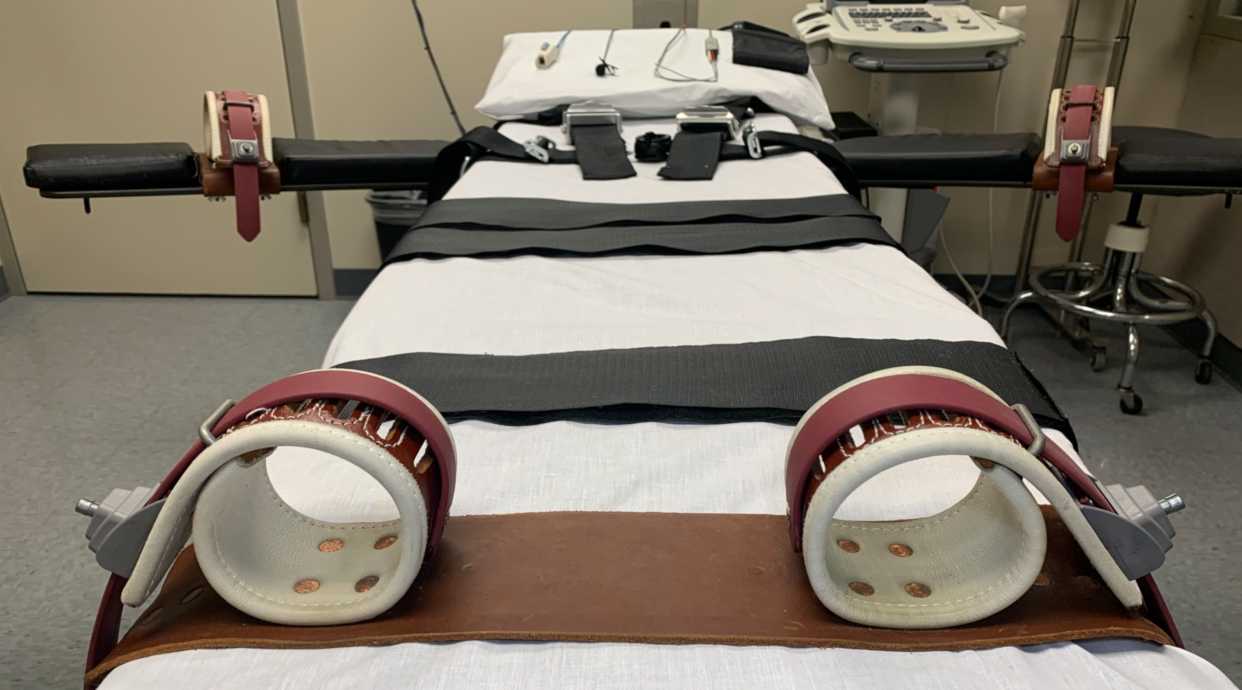Two decades after gunning down a trooper, death row inmate may never be executed

A death row inmate who claimed he is the antichrist and cannot die remains exempt from execution.
Ricky Ray Malone, 49, "has ... exhausted his appeals but is not competent to be executed," Oklahoma's attorney general has disclosed.
Malone fatally shot an Oklahoma Highway Patrol trooper 20 years ago on the day after Christmas. The case was highly publicized.
Malone has been diagnosed as schizophrenic, court records show. A Pittsburg County judge in 2017 decreed that he "is deemed presently insane and/or incompetent to be executed."
He exhausted his appeals in 2019.
The disclosure that he remains incompetent came in a legal case involving another death row inmate, James Chandler Ryder.
The Oklahoma Court of Criminal Appeals ruled Dec. 14 that Ryder's attorneys must follow a 2022 law in challenging his competency. Ryder had been set for execution Feb. 1. The appeals court on Friday stayed his execution so the attorneys can make their challenge.
Attorney General Gentner Drummond and an assistant informed the appeals court about Malone's status in a footnote to a legal filing in October.
What happened when Oklahoma Highway Patrol trooper Nikky Green was killed in 2003?
The trooper, Nikky Green, was killed with his own gun during a struggle early Dec. 26, 2003, on a dirt road in Cotton County. Malone had been cooking methamphetamine outside his sister's car, according to testimony at a 2005 trial. He had fallen asleep in the front seat.
Malone, a former firefighter and paramedic, testified at the trial that he hadn't slept in three weeks because he was continuously “amped up on meth." He claimed he thought the trooper was a robber and that the “voices in my head” told him to shoot.
Jurors found him guilty of first-degree murder and chose a death sentence as punishment. The Court of Criminal Appeals in 2007 upheld his conviction but ruled he must be resentenced because victim impact testimony had been too emotional.
Malone had a judge resentence him instead of a jury. The judge in 2010 chose the death penalty.
Green was 35. The trooper's final six minutes were described by the appeals court in its 2007 opinion as "poignant and heartbreaking." The sounds of the struggle and the trooper's pleas for his life were recorded by his dashcam.
His last words, according to the court, was: “Please don't. For the name of Jesus Christ. He'll deliver. Lord Jesus!"
More: Judge rules Oklahoma death row inmate Benjamin Cole competent to be executed
In a book published in March, his widow, Linda Green-Bennett, wrote, "Listening to that ripped my heart out."
"In the final minute of his life, the Oklahoma State Bureau of Investigation technicians agreed: Nik shifted from trying to reason with someone totally scrambled on meth ... to a simple prayer to God in Christ," the widow wrote.
When did the ban on executing those deemed incompetent begin?
The U.S Supreme Court in 1986 barred states from inflicting the death penalty upon a prisoner who has become insane.
The term now is considered derogatory in society but is still used in capital punishment litigation. It is increasingly referred to, though, as incompetency.
It means an inmate no longer has a rational understanding of why he is being executed.
A 2013 study found that 20 death row inmates in the United States had been found to be insane since the landmark 1986 decision. Justices pointed to the constitutional prohibition against cruel and unusual punishment as the reason for the ban.
What is death row inmate Ricky Malone's mental state?
Malone's case was put on hold in 2008 because of his mental issues. His resentencing went forward only after he was treated at the Oklahoma Forensic Center in Vinita.
At the resentencing, two experts testified on his behalf that he had been mentally ill for a long time.
After the resentencing, a psychiatrist hired by his attorneys twice evaluated Malone and concluded he suffers from schizophrenia.
"He has delusions that he has been resurrected and cannot be killed," the psychiatrist, Raphael Morris, reported in 2014.
The psychiatrist reported in 2016 after the second evaluation that Malone's condition "has appreciably deteriorated."
At a judge's request, a state psychologist evaluated Malone in 2017 for an hour after the prison began forcibly injecting him with antipsychotic medication.
The psychologist, Scott Orth, concluded Malone "is currently unable to demonstrate a rational understanding of the fact that he will be executed at the conclusion of his appeals."
Orth is the director of forensic psychology at the Oklahoma Forensic Center.
He wrote: "Mr. Malone expressed numerous grandiose delusions about his belief that he 'cannot die,' has been 'resurrected three times,' and alludes to his belief that he ate part of his ear back in 2016 to show that it will 'grow back' as 'proof that I'm the anthropic principle antichrist who'll start the rapture.'"
During the evaluation, Malone appeared to respond to hallucinations by stopping his responses, looking around and murmuring, Orth also wrote. Malone claimed his victim is still alive and "working here."
Oklahoma resumed executions in late October 2021 after a hiatus of more than six years.
This article originally appeared on Oklahoman: Death row inmate Ricky Ray Malone remains ineligible for execution

